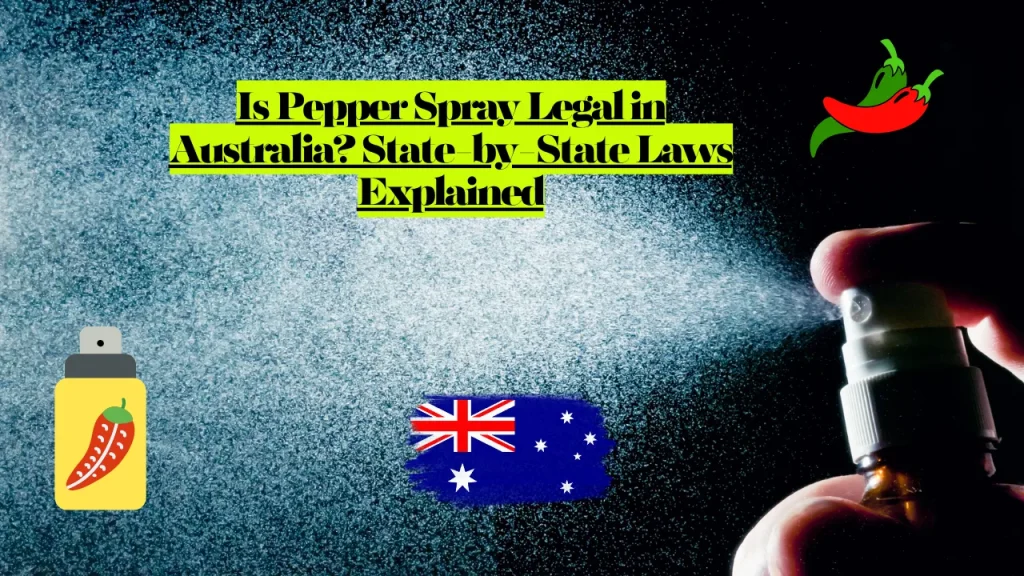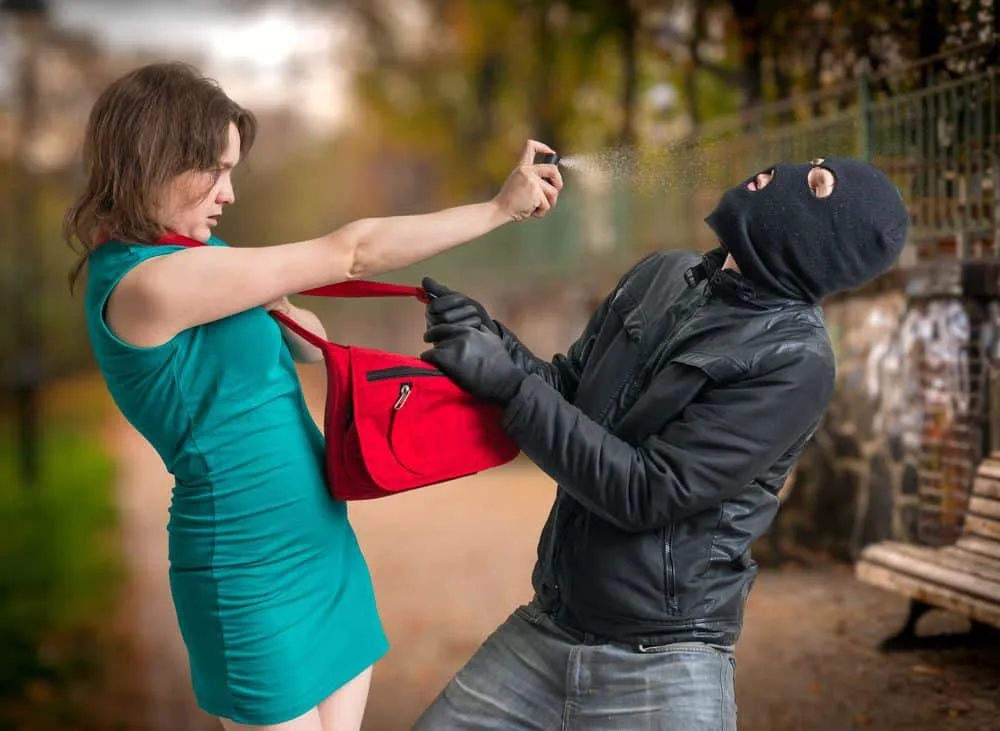Is Pepper Spray Legal in Australia? State-by-State Laws Explained
Is pepper spray legal in Australia? The answer depends on where you live. Pepper spray is highly regulated across Australia, with most states classifying it as a prohibited weapon requiring a lawful excuse or permit to possess. The major exception is Western Australia, where pepper spray is legal under certain conditions. Understanding these laws is crucial because unlawful possession can result in serious criminal charges, hefty fines, and even imprisonment.
What Is Pepper Spray?
Pepper spray, also known as OC spray (oleoresin capsicum) or capsicum spray, is a self-defense device that releases an irritant substance derived from chili peppers. When sprayed into someone’s eyes or inhaled, it causes immediate eye closure, difficulty breathing, coughing, and severe discomfort lasting 20-90 minutes.
Police commonly use pepper spray to control riots, crowds, and for self-defense purposes. However, what’s legal for law enforcement isn’t necessarily legal for private citizens in Australia.
Pepper Spray Laws by State
Western Australia: Legal with Conditions
Western Australia is the only state where pepper spray is legal. It’s classified as a controlled weapon rather than a prohibited weapon, meaning you can carry it for self-defense if you have reasonable grounds to do so.
“Reasonable grounds” typically means you have legitimate concerns about assault or intimidation, such as:
- Being a previous victim of violent crime
- Having credible threats against you
- Working in high-risk environments
The limitation here is that WA law primarily protects people who have already experienced violence, rather than those who feel generally unsafe.
Related article: Is Rainbet Legal in the US? Understanding Crypto Casino Regulations

New South Wales: Permits Available But Difficult
In NSW, pepper spray is a prohibited weapon under Schedule 1 of the Weapons Prohibition Act 1998, making it illegal to possess without authorization.
You can apply for a permit, but the requirements are strict:
- Must have a genuine reason (not self-defense)
- Extensive background check
- No criminal convictions in the past 10 years
- Not subject to any Apprehended Violence Orders
- Breach of permit conditions carries penalties up to 12 months imprisonment and/or a $5,500 fine
Genuine reasons might include wildlife control, museum displays, or scientific research. Personal protection is not considered a valid reason for a permit.
Penalties in NSW:
- Maximum penalty for possession or use is 14 years imprisonment, though local courts typically impose up to 2 years
- Failing to surrender pepper spray when required: 12 months imprisonment and/or $5,500 fine
Victoria: Completely Prohibited
Pepper spray is a prohibited weapon in Victoria under the Control of Weapons Act 1990. The only exceptions are approval from the Chief Commissioner or Governor in Council Exemption Order.
Penalties in Victoria:
- Maximum penalty is 2 years imprisonment or 240 penalty units ($43,617.60)
These are among the harshest penalties in Australia, reflecting Victoria’s strict stance on prohibited weapons.
Queensland: Classified as a Firearm
Queensland takes an even stricter approach by classifying pepper spray as a firearm under Schedule 2 of the Weapons Act 1990.
Penalties in Queensland:
- Maximum 7 years imprisonment or 300 penalty units for possession or use
- 2 years imprisonment or 100 penalty units for acquiring without a license
- License and registration required for lawful possession
A legitimate reason is required to obtain a license, which can include sport shooting, job-related needs, or weapon collection—but not personal self-defense.
South Australia: Dangerous Article
In South Australia, pepper spray is categorized as a dangerous article under the Summary Offences Regulations 2016, with a maximum penalty of $2,500.
Harsher penalties apply if the offense occurs on or near licensed premises, with potential penalties reaching 2 years imprisonment or $10,000 in fines.
Tasmania: Illegal Without Lawful Excuse
Pepper spray possession and use is illegal in Tasmania under section 15C(1) of the Police Offences Act 1935 unless you have a lawful excuse.
Lawful excuses include:
- Legal sports or entertainment
- Lawful collection or exhibition
- Religious practices
- Lawful job duties
Penalties: Maximum 2 years imprisonment and/or 50 penalty units.
Related article: Is Pepper Spray Legal in NYC? Why You Can’t Buy Self-Defense Online (But Reform Is Coming in 2025)

Australian Capital Territory and Northern Territory
In the ACT, pepper spray is a prohibited weapon, making it illegal to possess or use. Similar prohibitions apply in the Northern Territory, with both jurisdictions following strict weapon control laws.
Why Are These Laws So Strict?
Australia’s strict pepper spray laws stem from several concerns:
- Weapon escalation: Any self-defense weapon can potentially be turned against the victim or used by an attacker
- Misuse potential: Pepper spray could be used in assaults, robberies, or criminal activities
- Public safety: Indiscriminate use in crowded areas could harm innocent bystanders
- Medical risks: While generally non-lethal, pepper spray can cause serious complications for people with respiratory conditions
The philosophy behind Australian weapon laws prioritizes reducing weapon availability overall rather than arming citizens for self-defense.
What Happens If You’re Caught with Pepper Spray?
Getting caught with pepper spray can result in:
Immediate Consequences:
- Confiscation of the pepper spray
- On-the-spot fines
- Criminal charges
Court Penalties:
- Heavy fines ranging from $2,500 to over $40,000 depending on your state
- Imprisonment ranging from 2 to 14 years (though actual sentences are typically much lower)
- Criminal record affecting employment, travel, and housing
Additional Issues:
- Defect notices if found during vehicle searches
- Enhanced penalties if found during commission of another offense
- Loss of goods when attempting to import pepper spray
Can You Import Pepper Spray into Australia?
The Australian Government Department of Home Affairs states that potential penalties for pepper spray include loss of goods, on-the-spot fines, prosecution, and large financial penalties.
Attempting to import pepper spray through mail or bringing it through customs will result in:
- Immediate confiscation
- Potential criminal charges
- Fines and prosecution
Border Force actively screens for prohibited weapons, and pepper spray is on their watch list.
Legal Self-Defense Alternatives in Australia
Since pepper spray is illegal in most of Australia, what can you legally carry for personal protection?
Personal Safety Alarms
Legal in all states and territories, personal safety alarms emit loud, high-pitched sounds (120+ decibels) to:
- Attract attention from bystanders
- Startle and deter attackers
- Alert people nearby that you need help
These devices are small, affordable, and clip onto keychains or bags.
Tactical Flashlights
High-powered flashlights with 500+ lumens can temporarily disorient an attacker when shone directly in their eyes. They’re completely legal and serve a practical everyday purpose.
Self-Defense Training
The most effective legal option is learning self-defense techniques through:
- Krav Maga classes
- Brazilian Jiu-Jitsu
- Boxing or kickboxing
- Basic self-defense workshops
Physical skills can’t be taken from you or used against you like a weapon can.
Safety Apps
Smartphone apps can:
- Send automatic alerts to emergency contacts
- Share your live location
- Record audio/video evidence
- Connect directly to emergency services
Popular options include Emergency+, bSafe, and various state-specific safety apps.
Other Legal Options
- Whistles: Simple but effective at drawing attention
- Air horns: Legal and extremely loud
- Walking sticks or umbrellas: Legal everyday items that can create distance from attackers
Common Questions About Pepper Spray in Australia
Can I carry pepper spray if I’m being stalked or threatened?
Even with credible threats against you, pepper spray remains illegal in most states. In WA, you may have reasonable grounds, but in other states you should report threats to police and consider legal alternatives like personal alarms.
What if I bought it overseas before knowing it was illegal?
Ignorance of the law isn’t a defense. If you unknowingly possess pepper spray, contact your local police to arrange safe surrender during an amnesty period if available. Don’t simply carry it or try to dispose of it yourself.
Is pepper spray legal for security guards in Australia?
Security guards cannot legally carry pepper spray for their work unless they have specific authorization, which is rare. Most security roles use other de-escalation techniques and communication.
Are there any “legal” pepper sprays sold in Australia?
Some products marketed as “legal self-defense sprays” contain different chemicals than capsaicin. However, any spray designed to temporarily disable or harm someone is likely classified as a prohibited weapon. Always check with your state’s police weapons licensing department before purchasing.
What about pepper gel or foam versions?
Alternative delivery methods like gel or foam are still considered pepper spray under Australian law and face the same prohibitions and penalties.
Can farmers or rural property owners carry pepper spray for wild animals?
Even for animal control, pepper spray typically requires permits and specific authorization. Farmers dealing with dangerous wildlife should consult with their state’s wildlife management department for legal deterrent options.
Situational Awareness: Your Best Defense
The most effective self-defense doesn’t come from any device—it comes from awareness and prevention:
- Stay alert to your surroundings, especially in unfamiliar areas
- Avoid isolated areas, particularly at night
- Trust your instincts—if something feels unsafe, leave immediately
- Keep your phone charged and accessible
- Plan your routes in advance
- Walk confidently and purposefully
- Tell someone where you’re going and when you expect to arrive
- Avoid distractions like headphones or phone use when walking alone
Should Australia’s Pepper Spray Laws Change?
This remains a contentious issue. Proponents of legalization argue:
- Women and vulnerable people need effective self-defense options
- Criminals don’t follow weapon laws anyway
- Other countries successfully allow pepper spray
Opponents maintain:
- Introducing more weapons increases overall violence
- Pepper spray can easily escalate situations or be used against victims
- Legal alternatives exist for personal safety
Regardless of personal opinions on the issue, current laws remain strict across most of Australia.
Legal Disclaimer: This article provides general information about pepper spray laws in Australia for educational purposes only and does not constitute legal advice. Laws can change, and individual circumstances vary. Always consult with your state or territory police weapons licensing department or a qualified legal professional before making decisions about self-defense tools. For specific legal guidance, contact a criminal defense lawyer in your jurisdiction.
Emergency Resources:
- Emergency Services: 000
- Police Assistance Line: 131 444 (non-emergency)
- NSW Police Weapons Licensing: Contact your local police station
- Victoria Police Licensing: 1300 651 645
- Queensland Weapons Licensing: 1300 651 645
- WA Police Licensing: (08) 9222 1920
- SA Police Firearms Branch: (08) 7322 3346
About the Author

Sarah Klein, JD, is a licensed attorney and legal content strategist with over 12 years of experience across civil, criminal, family, and regulatory law. At All About Lawyer, she covers a wide range of legal topics — from high-profile lawsuits and courtroom stories to state traffic laws and everyday legal questions — all with a focus on accuracy, clarity, and public understanding.
Her writing blends real legal insight with plain-English explanations, helping readers stay informed and legally aware.
Read more about Sarah
